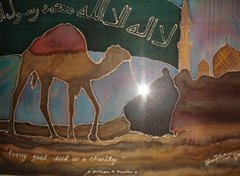
POS-2
THE NAFS AND THE RUH
Do these terms signify one and the same thing or are they two distinctly different entities? The nafs (soul) and the ruh (spirit) are two names for one and the same thing. However, others maintain that they are two different entities. The latter is not a tenable position because it lacks clear, unequivocal delineations of these two terms from the Qur’an and the Sunnah. Rather, it is a result of misunderstanding of the terminology in these texts and personal conjecture. One group, consisting of some hadith scholars, jurists and Sufis, states that “the ruh is other than the nafs.”
Do these terms signify one and the same thing or are they two distinctly different entities? The nafs (soul) and the ruh (spirit) are two names for one and the same thing. However, others maintain that they are two different entities. The latter is not a tenable position because it lacks clear, unequivocal delineations of these two terms from the Qur’an and the Sunnah. Rather, it is a result of misunderstanding of the terminology in these texts and personal conjecture. One group, consisting of some hadith scholars, jurists and Sufis, states that “the ruh is other than the nafs.”
THE CORRECT VIEW
As maintained by the vast majority of Muslim theologians and endorsed by the scholars of the Ahl As-Sunnah, the terms “nafs” and “ruh” are interchangeable. However, the term “nafs” usually applies when the soul is inside the body, and the word “ruh” is used when the soul is apart from the body. Although these terms may be used interchangeably in relation to their essence, the difference between them is merely a difference in attributes and usage. Each one has clearly distinct and restricted applications in certain contexts.
THE NAFS
For example, the term “nafs” may be used to mean blood as indicated saying, “Salat nafsuhu (His blood flowed).” Since death resulting from the flowing of one’s blood necessitates the exit of one’s soul, blood came to be referred to as “nafs”
“Nafs” may be used to mean “the eye” (“ayn”) – commonly referred to as “the evil eye.” For instance, it is said, “Asabat fulanan nafsun (‘So and so has been struck by an [evil] eye.’)”
Upon occasion, the word “nafs” may represent the self (dhat) is evident in a number of Qur’anic verses.
Surah 24 An-Nur (The Light)
THE NAFS
For example, the term “nafs” may be used to mean blood as indicated saying, “Salat nafsuhu (His blood flowed).” Since death resulting from the flowing of one’s blood necessitates the exit of one’s soul, blood came to be referred to as “nafs”
“Nafs” may be used to mean “the eye” (“ayn”) – commonly referred to as “the evil eye.” For instance, it is said, “Asabat fulanan nafsun (‘So and so has been struck by an [evil] eye.’)”
Upon occasion, the word “nafs” may represent the self (dhat) is evident in a number of Qur’anic verses.
Surah 24 An-Nur (The Light)
61.There is no restriction on the blind, nor any restriction on the lame, nor any restriction on the sick, nor on yourselves, if you eat from your houses, or the houses of your fathers, or the houses of your mothers, or the houses of your brothers, or the houses of your sisters, or the houses of your father's brothers, or the houses of your father's sisters, or the houses of your mother's brothers, or the houses of your mother's sisters, or (from that) whereof you hold keys, or (from the house) of a friend. No sin on you whether you eat together or apart. But when you enter the houses, greet one another with a greeting from Allah (i.e. say: عليكم As-Salamu 'Alaikum - peace be on you) blessed and good. Thus Allah makes clear the Ayat (these Verses or your religious symbols and signs, etc.) to you that you may understand.
Different kinds of nafs
The nafs which is inclined to evil (the tempting self)
Surah 12 Yusuf (The Prophet Joseph)
53. "And I free not myself (from the blame). Verily, the (human) self (nafs) is inclined to evil, except when my Lord bestows His Mercy (upon whom He wills). Verily, my Lord is Oft-Forgiving, Most Merciful."
The nafs which is self-reproaching (conscience)
Surah 75 Al-Qiyamah (The Resurrection)
Different kinds of nafs
The nafs which is inclined to evil (the tempting self)
Surah 12 Yusuf (The Prophet Joseph)
53. "And I free not myself (from the blame). Verily, the (human) self (nafs) is inclined to evil, except when my Lord bestows His Mercy (upon whom He wills). Verily, my Lord is Oft-Forgiving, Most Merciful."
The nafs which is self-reproaching (conscience)
Surah 75 Al-Qiyamah (The Resurrection)
2. And I swear by the self-reproaching person (nafs) (a believer).
The nafs which is in (complete) rest and satisfaction (the soul of a believer)
Surah 89 Al-Fajr (The Break of Day or The Dawn)
27. (It will be said to the pious): "O (you) the one (nafs) in (complete) rest and satisfaction!
28. "Come back to your Lord, Well-pleased (yourself) and well-pleasing unto Him!
29. "Enter you, then, among My honoured slaves,
30. "And enter you My Paradise!"
This does not mean that each person has three souls; what it means is that these are attributes and conditions that may apply to one soul. The commentator on at-Tahaawiyyah said, after mentioning the different kinds of nafs: “In fact they are one nafs which has different attributes. It is inclined to evil, but if is influenced by faith, it becomes self-reproaching, so it may commit sin but then it blames itself and alternates between doing and not doing. If faith becomes strong, it becomes the soul in (complete) rest and satisfaction.” (Sharh at Tahaawiyyah, p 445)
The nafs which is in (complete) rest and satisfaction (the soul of a believer)
Surah 89 Al-Fajr (The Break of Day or The Dawn)
27. (It will be said to the pious): "O (you) the one (nafs) in (complete) rest and satisfaction!
28. "Come back to your Lord, Well-pleased (yourself) and well-pleasing unto Him!
29. "Enter you, then, among My honoured slaves,
30. "And enter you My Paradise!"
This does not mean that each person has three souls; what it means is that these are attributes and conditions that may apply to one soul. The commentator on at-Tahaawiyyah said, after mentioning the different kinds of nafs: “In fact they are one nafs which has different attributes. It is inclined to evil, but if is influenced by faith, it becomes self-reproaching, so it may commit sin but then it blames itself and alternates between doing and not doing. If faith becomes strong, it becomes the soul in (complete) rest and satisfaction.” (Sharh at Tahaawiyyah, p 445)
THE RUH
Just as the term “nafs” has several different connotations, so does the term “ruh”. It is never used to refer to the physical body (badan) alone or to the soul when it is inside the body. Rather it has various usages in Arabic language and in religious literature.
In the following words of Allah to His Messenger (saw), it is used to mean revelation, specifically, the Qur’an:
Surah 42 Al-Shura (The Consultation)
52. And thus We have sent to you (O Muhammad SAW) Ruhan (an Inspiration, and a Mercy) of Our Command. You knew not what is the Book, nor what is Faith? But We have made it (this Quran) a light wherewith We guide whosoever of Our slaves We will. And verily, you (O Muhammad SAW) are indeed guiding (mankind) to the Straight Path (i.e. Allah's religion of Islamic Monotheism).
In other places in the Qur’an the word “ruh” is used to designate Angel Jibreel, whom Allah entrusted with the conveyance of divine revelation.
Just as the term “nafs” has several different connotations, so does the term “ruh”. It is never used to refer to the physical body (badan) alone or to the soul when it is inside the body. Rather it has various usages in Arabic language and in religious literature.
In the following words of Allah to His Messenger (saw), it is used to mean revelation, specifically, the Qur’an:
Surah 42 Al-Shura (The Consultation)
52. And thus We have sent to you (O Muhammad SAW) Ruhan (an Inspiration, and a Mercy) of Our Command. You knew not what is the Book, nor what is Faith? But We have made it (this Quran) a light wherewith We guide whosoever of Our slaves We will. And verily, you (O Muhammad SAW) are indeed guiding (mankind) to the Straight Path (i.e. Allah's religion of Islamic Monotheism).
In other places in the Qur’an the word “ruh” is used to designate Angel Jibreel, whom Allah entrusted with the conveyance of divine revelation.
Surah 26 Al-Shu’ara (The Poets)
192. And truly, this (the Quran) is a revelation from the Lord of the 'Alamin (mankind, jinns and all that exists),
193.Which the trustworthy Ruh [Jibrael (Gabriel)] has brought down;
The various forces and senses contained in the human body are also spoken of as “spirits.”
“ar-ruh al-basir” (“the seeing spirit”) and “ar-ruh as-sami” (“the hearing spirit”)
The senses are extinguished upon the death of the physical body, and they are different than the ruh, which does not die or disintegrate.
Finally, the term “ruh” is sometimes used in an extreme restricted sense to designate the spirit of faith which results from one’s knowledge of Allah, from turning to Him in repentance and from seeking Him with love and aspiration
Allah (swt) says:
Surah 58 Al-Mujadilah (The Woman who disputes)
22. You (O Muhammad SAW) will not find any people who believe in Allah and the Last Day, making friendship with those who oppose Allah and His Messenger (Muhammad SAW), even though they were their fathers, or their sons, or their brothers, or their
22. kindred (people). For such He has written Faith in their hearts, and strengthened them with Ruh (proofs, light and true guidance) from Himself. And We will admit them to Gardens (Paradise) under which rivers flow, to dwell therein (forever). Allah is pleased with them, and they with Him. They are the Party of Allah. Verily, it is the Party of Allah that will be the successful.
In this manner, knowledge is a “ruh” (“spiritual force”), as in sincerity, truthfulness, repentance, love of Allah and complete dependence on Him
Authentic traditions from the Prophet (saw) clearly establish that the ruh and the nafs are essentially one and the same thing.
Umm Salamah reported Allah’s Messenger (saw) as saying: When the ruh is taken out, the eyesight follows it.” (Muslim)
Abu Hurayrah reported that the Prophet (saw) said: “Do you not see when a person dies his gaze is fixed intently; that occurs when his eyesight follows his nafs (as it comes out).” (Muslim)
Clearly, the word “ruh” was used in the first narration and the word “nafs was used in the second, the two terms are, in essence, interchangeable.
In this manner, knowledge is a “ruh” (“spiritual force”), as in sincerity, truthfulness, repentance, love of Allah and complete dependence on Him
Authentic traditions from the Prophet (saw) clearly establish that the ruh and the nafs are essentially one and the same thing.
Umm Salamah reported Allah’s Messenger (saw) as saying: When the ruh is taken out, the eyesight follows it.” (Muslim)
Abu Hurayrah reported that the Prophet (saw) said: “Do you not see when a person dies his gaze is fixed intently; that occurs when his eyesight follows his nafs (as it comes out).” (Muslim)
Clearly, the word “ruh” was used in the first narration and the word “nafs was used in the second, the two terms are, in essence, interchangeable.


